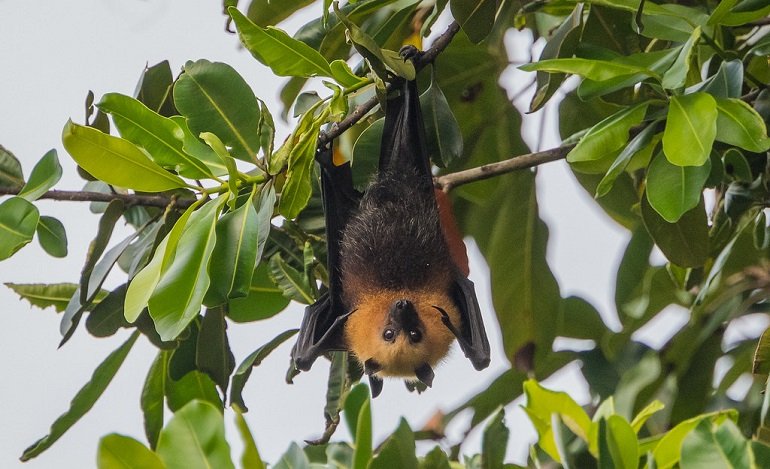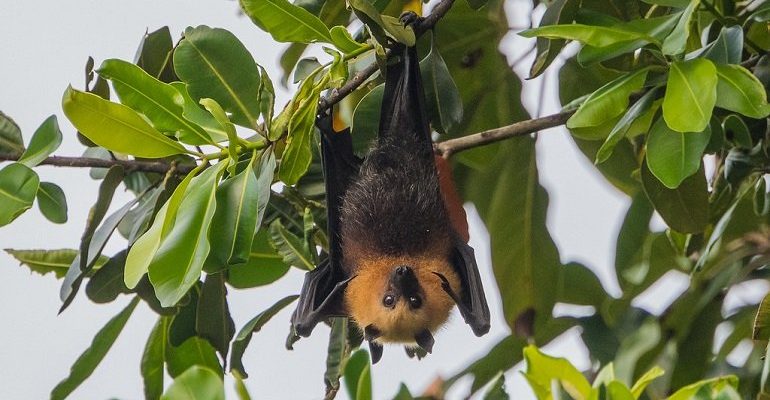
These bats are not just some oddball species floating around. Their presence is vital. Without them, many plants would struggle to reproduce, leading to a domino effect that impacts everything from the smallest insects to the largest trees. Let’s explore how fruit bats impact their surroundings, why they matter to us, and what challenges they face in today’s changing world.
What Are Fruit Bats?
Fruit bats belong to the family Pteropodidae and are found in the tropics and subtropics of the world. They come in various shapes and sizes; some can have wingspans up to six feet! Unlike their smaller, insect-eating cousins, fruit bats primarily feast on nectar, fruits, and flowers.
These bats are nocturnal, meaning they are most active at night. This is when they take to the skies, using their keen sense of smell to locate ripe fruit. Here’s the thing: just like bees buzzing from flower to flower, fruit bats also play a significant role in pollination. When they feed, they transfer pollen from one flower to another, promoting plant reproduction.
Another interesting fact? Their long tongues help them reach deep into flowers to access nectar. In the process, they inadvertently collect and spread pollen, contributing to the health of our ecosystems.
Pollination: Nature’s Unsung Heroes
Pollination is a vital process for many plants, and fruit bats are excellent at it. You might be wondering how they can be so effective. Well, unlike other pollinators, they can visit several flowers in one night, which increases the chances of successful pollination.
For example, in some tropical regions, certain species of figs rely almost entirely on fruit bats for pollination. Without these bats, the fig trees would struggle to reproduce, affecting not just the trees, but also the animals that depend on them for food.
Moreover, the relationship between fruit bats and plants is often a mutualistic one. While bats get a meal, plants get the chance to reproduce. This connection underlines how interconnected life is; every species has a role to play.
Seed Dispersal: The Spreading of Life
Fruit bats are not only pollinators; they also act as seed dispersers. After feeding on fruits, they often fly long distances before excreting the seeds, effectively planting new trees and plants far from the parent plant.
This process is essential for plant growth and forest regeneration. For instance, some rainforest trees rely on fruit bats to spread their seeds over vast areas, helping to maintain biodiversity.
Imagine a fruit bat munching on a juicy mango. It flies away, leaving seeds in its droppings as it goes. This action helps ensure that new mango trees can grow, creating a healthier ecosystem that supports countless other species. It’s like a natural planting service!
Fruit Bats and Climate Health
You might not have considered how fruit bats contribute to climate health. They help maintain forests, which are crucial for carbon sequestration. Healthy forests absorb carbon dioxide from the atmosphere, helping to mitigate climate change.
When fruit bats aid in forest growth through pollination and seed dispersal, they indirectly contribute to a healthier planet. Their work supports not just local ecosystems, but global efforts to combat climate change.
In addition, diverse forests are more resilient to threats like disease and pests. Fruit bats play a role in this resilience by helping to sustain a variety of plant species.
Threats to Fruit Bats
Despite their importance, fruit bats face numerous threats today. Habitat destruction is a significant concern. As forests are cut down for agriculture or urban development, the places where bats roost and feed vanish. This loss of habitat can lead to declining bat populations.
Additionally, hunting and hunting pressures in some areas lead to further decreases in their numbers. Many cultures view fruit bats as pests due to the potential for fruit crop damage. However, it’s essential to recognize that their benefits to ecosystems far outweigh this issue.
Climate change also impacts fruit bats by altering their habitats and food sources. As temperatures rise and weather patterns shift, these bats may find it harder to find food or suitable roosting sites.
Conservation Efforts for Fruit Bats
Fortunately, several conservation efforts aim to protect these vital creatures. Many organizations are working to raise awareness about the role of fruit bats in ecosystems and promote coexistence with humans.
For example, establishing protected areas can help preserve their habitats. Educating farmers about the benefits of fruit bats can reduce the fear surrounding these animals, encouraging people to protect them rather than hunt them.
Engaging local communities in conservation initiatives can also make a big difference. When people understand how fruit bats benefit their environment, they are more likely to protect them.
How You Can Help
You might be surprised by how much you can contribute to fruit bat conservation. Here are a few ways to get involved:
- Spread Awareness: Share information about fruit bats and their roles in ecosystems on social media or in your community.
- Support Conservation Organizations: Donate to or volunteer with groups dedicated to protecting fruit bats and their habitats.
- Advocate for Sustainable Practices: Encourage local governments and organizations to adopt sustainable land-use practices that protect natural habitats.
- Respect Nature: If you live in an area where fruit bats are present, withhold from harming them or their habitats. Appreciate their role in nature!
Making small changes in how we think about and interact with wildlife can have a huge impact.
Fruit bats might seem like an unusual topic, but they play a vital role in maintaining the health of our ecosystems. From pollinating flowers to dispersing seeds, these creatures are essential for biodiversity and climate health.
As we’ve explored, their decline poses a serious threat not just to forests, but to many species that rely on those forests for survival. By taking steps to protect fruit bats and raise awareness, we can help ensure that these magnificent creatures continue to thrive. So, let’s celebrate the fruit bat, nature’s true little gardeners, and the invaluable work they do every day.

